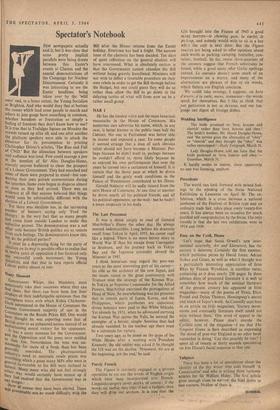The Last Proconsul It was a shock simply to read
of General MacArthur's illness the other day. He always seemed indestructible. Long before his dramatic recall from Tokyo in April, 1951, his career read like a legend. There is no more heroic story. in World War. II than his escape from Corregidor to Brisbane, and his journey back to Tokyo Bay and the Japanese surrender aboard the Missouri in 1945.
I think historians may regard the post-war years as the most interesting part of his career— his role as the architect of the 'new Japan, and the issues raised in the great controversy with Truman over the strategy of the Korean War. In Tokyo, as Supreme Commander for the Allied Powers, MacArthur exercised the prerogatives of Head of State, So overwhelming was his presence that in remote parts of Japan, Korea, and the Philippines, where pantheons are capacious,• divine honours were paid to this White Mikadci. Yet already by 1951, when he advocated carrying the Korean War across the Yalu, he seemed the exemplar of a heroic, simple America that had already vanished. In the nuclear age there must be a substitute for victory.
Two years ago, as he stood on the steps of the White Hotise after a meeting with :President Kennedy,., the old soldier was asked if he. thought the US was on the decline. 'Nonsense, We are at
the beginning, not the end,' he said. "


































 Previous page
Previous page